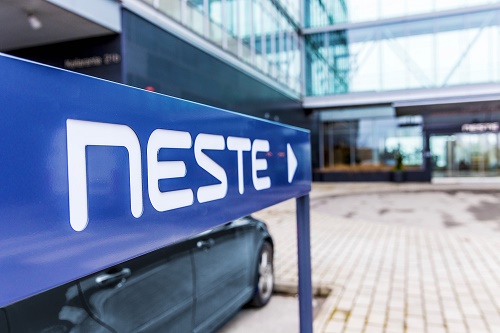Neste’s investments in Porvoo support the refinery’s competitiveness and reduce its environmental impact
Neste is rebuilding the wastewater treatment plant at its refinery in Porvoo, Finland. The project involves renewing the chemical and biological treatment systems of the wastewater plant, and the entire project is scheduled for completion in 2020. The changes will improve the efficiency of wastewater treatment and ensure the processing capacity. The investment, which will cost EUR 50 million, is being carried out in cooperation with Borealis Polymers Oy, the other user of the plant.

“Wastewater plant operations play a key role in minimizing refinery emissions, because water is discharged into waterways after treatment. Thanks to the plant, the amount of oil emissions into the sea is already very low, about 10% of the amount permitted for wastewater treatment plants under refinery’s environmental permit,” says Vice President of Production Marko Pekkola and continues: “Our goal in accordance with our principles of responsibility is to ensure that all our operations are safe for the local area, for our customers and for the environment.”
Every year, Neste invests significantly in its plants with regard to the environment, resource efficiency, safety, and improved competitiveness. The solvent deasphalting unit that came into operation at the Porvoo refinery last summer has made it possible to reduce the production of heavy fuel oils. At the same time, we will be able to increase the production of diesel and comply with the International Maritime Organization’s (IMO) global sulfur regulation, which enters into force in 2020. This imposes a global sulfur cap of 0.5 percent for marine fuels. This will reduce sulfur and particulate emissions when using Neste fuels.
The asphaltene recovered in the pretreatment unit can later be used as a fuel at the new power plant in Kilpilahti, Porvoo. This contributes to the area’s circular economy.
“In 2017 we made improvements in many areas, for example, to better ensure uninterrupted production. We focused in particular on safeguarding the local environment at each of our production sites. For example, the air quality at the Porvoo refinery was generally good in 2017, and complies with all the guidelines and is below all the limits set by Finland and the European Union. Most of the time it also meets the World Health Organization’s stringent recommendations. The implementation of noise barrier investments was also completed last year, reducing noise near the refinery,” Pekkola says.

